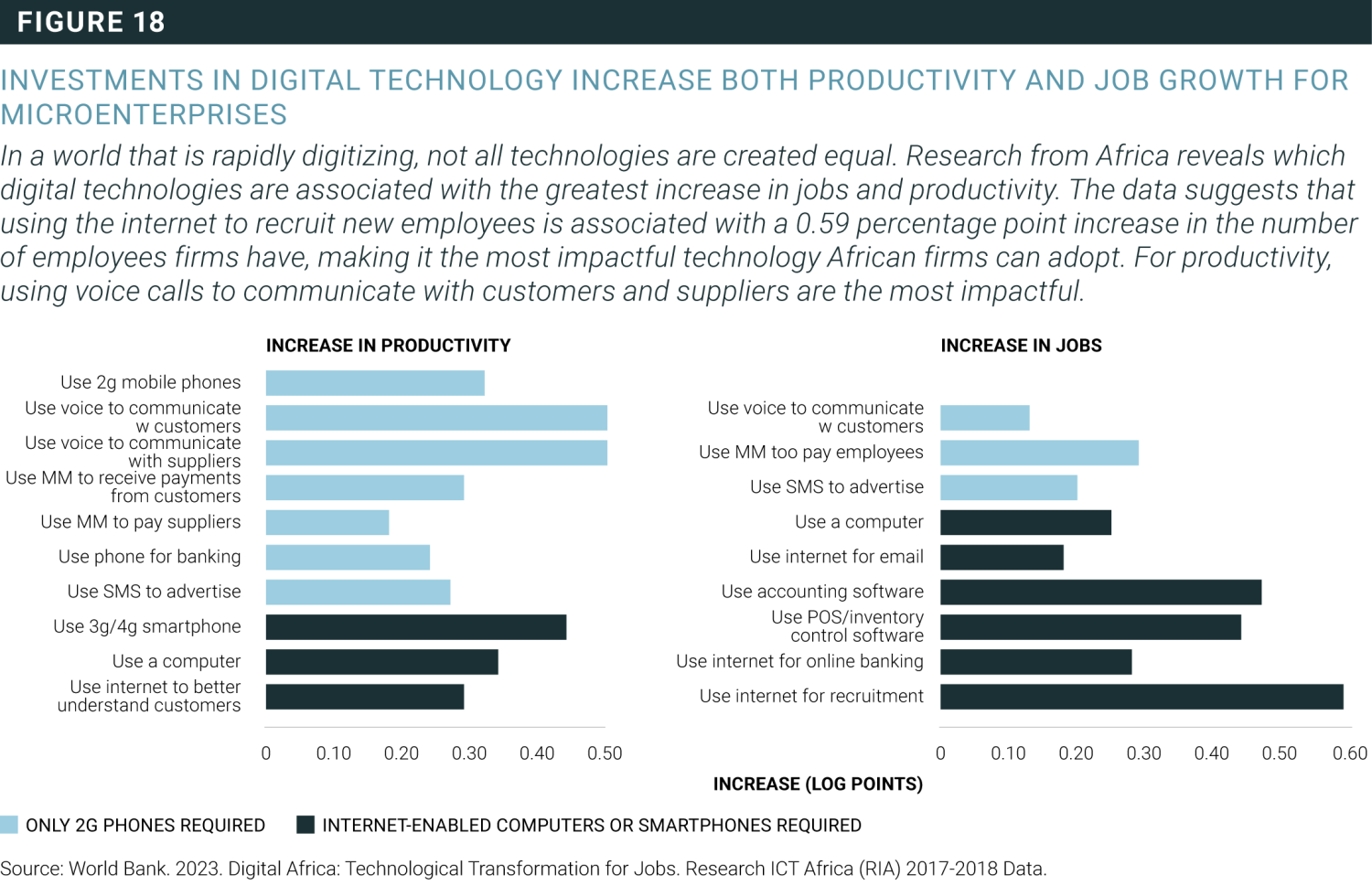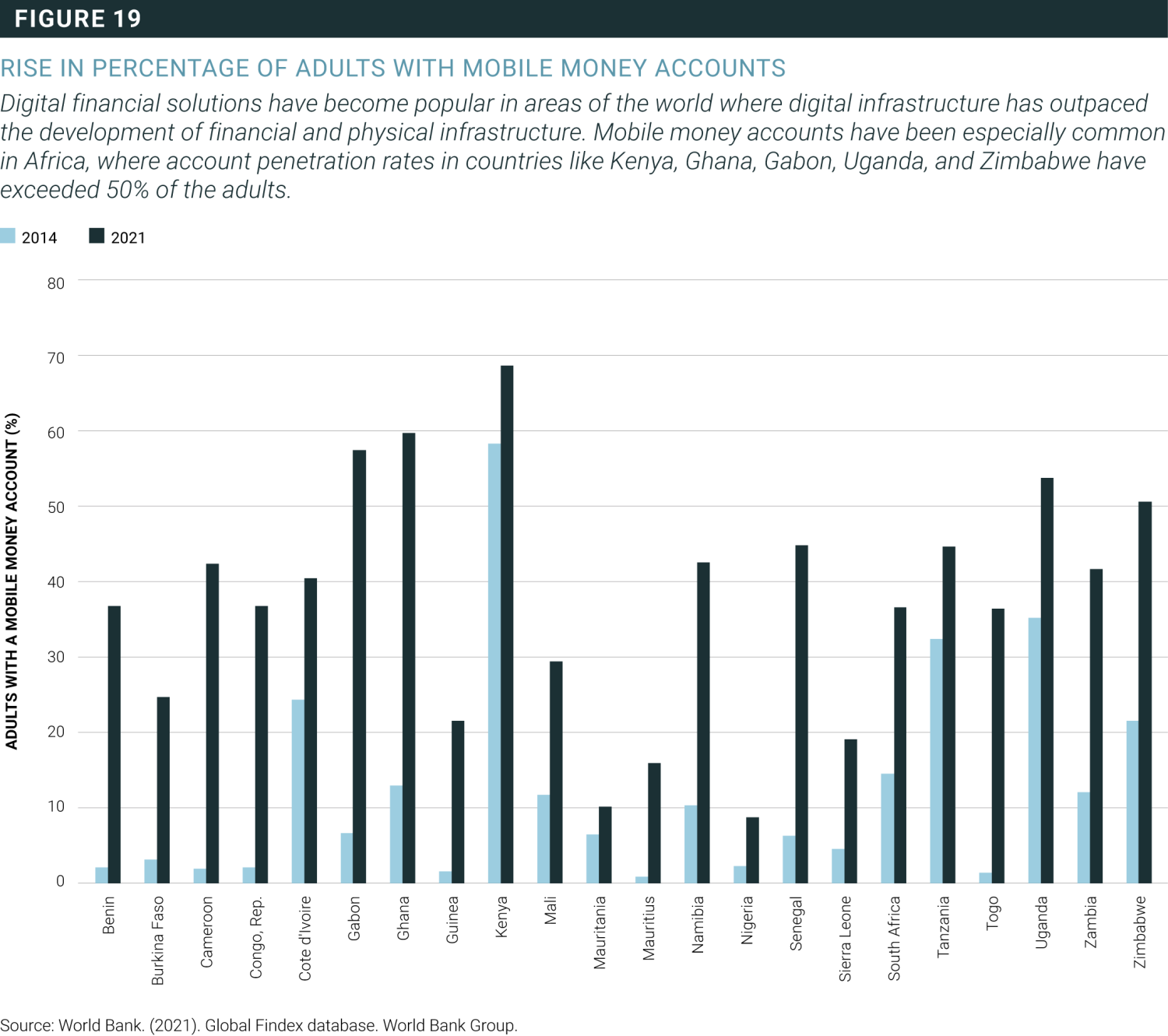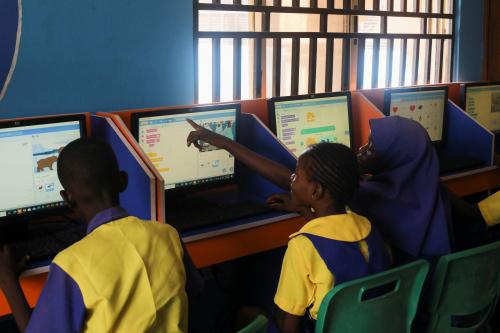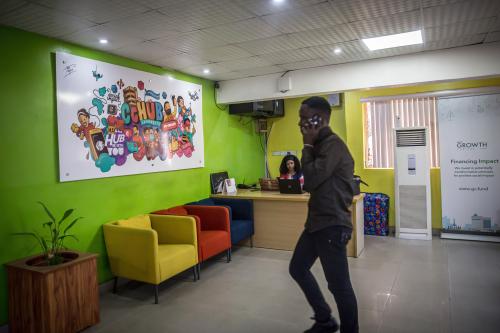In Chapter 5 of Foresight Africa 2024, our authors consider policy options to unlock the potential of the digital economy.
Essay
Fostering an inclusive digital economy in Africa
By Landry Signé, Senior Fellow, Global Economy and Development, Brookings; Haroon Bhorat, Nonresident Senior Fellow, Global Economy and Development, Brookings
Introduction
In the face of a rapidly evolving digital frontier,1 African economies can either seize the opportunities by investing in an inclusive digital economy or can be at risk of falling further behind due to significant gaps in infrastructure, technology, and skills.2 There are undoubtedly myriad relevant and appropriate policy interventions which can be designed and proffered to aid a country or region’s digital development. While improving all components of the digital ecosystem should be considered as part of a balanced digitalization strategy, we suggest three key areas for policymakers to prioritize to accelerate digitalization across African economies in 2024: (i) Improving access to digital infrastructure and platforms, (ii) Developing digital skills in line with trends in demand for them, and (iii) promoting digital financial inclusion.
Policy recommendations for an inclusive digital economy in Africa
1. Digital infrastructure: Bolstering access, affordability, usage, and competitiveness
Our new Digitalization and Digital Skills Index confirmed that African countries lag behind G20 countries on indicators related to digital infrastructure.3 Since access to digital infrastructure is the foundational element upon which the broader digital ecosystem is built, investment in this area is critical. In order to strengthen Africa’s digital infrastructure, policymakers in 2024 should:
Expand fixed broadband. While the increase in use of mobile phones across Africa in recent years is encouraging and the potential for 5G infrastructure exciting, fixed broadband should be a priority to ensure that high-speed internet becomes more accessible and affordable and that firms are able to digitize within the continent.
Address broadband affordability. Digital technologies rely on affordable electricity and connectivity, yet mobile phone and internet connectivity remains expensive for many countries.4 To address affordability, policymakers can consider cross-subsidization by regulating prices for lifeline packages, increasing competition between ICT firms by auctioning spectrum licenses, and aggregating demand from public buyers to encourage network expansion.5
Increase access to digital infrastructure. This is critical to addressing gender and regional divides. Ultimately, a lack of digital infrastructure means that individuals are prevented from making use of digital technologies and performing activities online. In some economies, the digital gap is a symbol of exclusion, poverty, and inequality, which is worsened by the effects of unemployment, poorly functioning digital skilling programs, and sociocultural norms that deny women equal access to digital services.6
Governments can play key roles to prioritize underserved communities, including subsidizing the loss of revenue for ICT companies in marginalized or poor communities by requiring the industry to raise the cost of services in cities or by using Universal Service Funds that derive from ICT industry taxes, as long as management of the funds is more transparent than it has been in the past. Strategies should also be in place to prevent ICT companies from operating as oligopolies that exclude lower-income users by only providing high-cost bundles.7 Broadband strategies should promote regional integration that will grow networks and digital hubs to make them available to marginalized communities.
2. Digital skills development: Accelerating skilling, upskilling, and reskilling for the future of work
At the core of a competitive digital economy is a strong foundation in digital skills and human capital. Yet every African country with sufficient data lags behind the G20. At a time when demand for foundational digital skills is increasing (projected to account for 70% of the total demand for digital skills by 2030), African countries need to prioritize strategies to enhance the digital skills of a country’s population at the basic, intermediate, and advanced levels.8
At the core of a competitive digital economy is a strong foundation in digital skills and human capital.
Given limited resources, it is unrealistic to assume that investing in both basic education and technological postsecondary education to the extent needed is possible, creating a difficult tradeoff. Apart from a few more advanced countries in Southern Africa, primary schools are unlikely to have the minimum infrastructure required to conduct digital skills training specifically. Policymakers should therefore:
Prioritize investment in upgrading primary and secondary education due to its implications for lifelong learning. Lifelong learning will be impossible without students acquiring basic education: Technical, vocational, and other higher-order skills can only be built on a strong foundation of basic cognitive skills.9
Focus curriculum at all levels on developing socioemotional skills such as problem-solving, teamwork, tolerance, responsibility, and independence, which are associated with higher rates of entrepreneurship, mobility, and earnings.10 While STEM skills are needed, the digital economy will rely on citizens having a more diverse skill set. Afterschool programs can also support the development of these socioemotional skills.11
3. Digital finance: Advancing access, well-being, empowerment, and productive usage
Digital finance is the third key area that policymakers should target to accelerate the development of a digital economy. The first step in digital financial inclusion—ownership and use of a financial service account—has grown rapidly across African countries, likely fueled by the increase in mobile phone use. Yet there still remains a gap compared to G20 country averages, which is especially true for the most vulnerable countries—Benin, Madagascar, Malawi, and Niger. To improve digital finance across the continent, policymakers should:
Enable financial sector deepening by promoting regulation that addresses these barriers and extends the drivers to allow the opportunity for all citizens to benefit from digital finance. Governments can do this by promoting the use of blockchains for financial transactions and establishing a single identity for residents, which currently does not exist for about half of African countries. This will influence gender and urban-rural divides as well, as studies in Kenya and Uganda have found that financial inclusion for rural women increases with both the ownership of a mobile phone and ownership of a national identity card.1213
Address threats of fraud, cybersecurity, and high transactional costs. Consumer protection policies are critical to instill trust among the general public, without which certain populations will be inclined to stick to traditional forms of banking and cash transactions. Kenya has a strong consumer protection framework which could be a model for other African countries to improve trust.
Further formalize the informal sector. Africa already leads the world in digital financial inclusion, but leadership should continue to use the advantage of the rise in mobile banking to further formalize the informal sector through formal credit access and assessment using tools like AI, blockchain, and record keeping.14 More transparency and availability of borrower data and better protection of legal rights will also help increase the legitimacy and adoption of financial technology.15
Conclusion
Overall, policy recommendations that promote agile governance and an enabling business environment can help accelerate progress in these three key areas as well as other important factors for the digital economy including digital platforms and entrepreneurship.
By focusing on these three priority areas in 2024, while leveraging potential synergies, African countries can bridge the digital gap to boost Africa’s competitiveness in the digital economy with transformative benefits for African-led innovation and economic inclusion.
Viewpoints





More from Foresight Africa 2024

In Chapter 1, our authors share policy options to address economic challenges facing Africa.

In Chapter 2, our authors tackle the existential climate change crisis.

In Chapter 3, our authors focus on policies to support Africa’s entrepreneurs and small businesses.

In Chapter 4, our authors examine trends in regional economic integration and trade.

In Chapter 6, our authors explore the ways Africa’s women and girls are increasing opportunity for all.

In Chapter 7, our authors delve into ways African leaders can regain the trust of their citizens.
-
Footnotes
- This report builds on our recent publication: Bhorat, Haroon, Landry Signé, Zaakhir Asmal, Jabulile Monnakgotla, and Christopher Rooney. 2022. “Digitalization and digital skills gaps in Africa: An empirical profile.” The Brookings Institution. https://www.brookings.edu/articles/digitalization-and-digital-skills-gaps-in-africa-an-empirical-profile/.
- Digital Skills and Jobs Platform (DSCAP). 2021. “Digital Skills: The Why, the What and the How.” Methodological Guidebook V 2.0. https://thedocs.worldbank.org/en/doc/a4a6a0b2de23c53da91bf4f97c315bee-0200022021/original/DSCAP-Guidebook-Part2.pdf.
- Bhorat, Haroon, Landry Signé, Zaakhir Asmal, Jabulile Monnakgotla, and Christopher Rooney. The Brookings Institution. 2022. Ibid.
- Fox, L. and Landry Signé. The Brookings Institution. 2022. “From subsistence to disruptive innovation: Africa, the Fourth Industrial Revolution, and the future of jobs.” https://www.brookings.edu/articles/from-subsistence-to-disruptive-innovation-africa-the-fourth-industrial-revolution-and-the-future-of-jobs/.
- Pathways for Prosperity Commission. (PfPC). 2018. “Charting Pathways for Inclusive Growth.” https://pathwayscommission.bsg.ox.ac.uk/sites/default/files/2019-11/charting-pathways-report.pdf.
- Chetty, K., et. al. Economics. 2018. “Bridging the digital divide in the G20: skills for the new age.”
- Fox, L. and Landry Signé. The Brookings Institution. 2022. Ibid.
- International Finance Corporation (IFC). 2021. “Demand for Digital Skills in Sub-Saharan Africa: Key findings from a five-country study: Cote d’Ivoire, Kenya, Mozambique, Nigeria, and Rwanda.” https://www.datocms-assets.com/37703/1623797656-demand-for-digital-skills-in-sub-saharan-africa.pdf.
- Fox, L. and Landry Signé. Brookings Institution. 2022. Ibid.
- Arias, O., David K. Evans and Indhira Santos. 2019. The World Bank Group. “The Skills balancing Act in Sub-Saharan Africa: Investing in Skills for Productivity, Inclusivity, and Adaptability.” https://documents1.worldbank.org/curated/en/558991560840574354/pdf/The-Skills-Balancing-Act-in-Sub-Saharan-Africa-Investing-in-Skills-for-Productivity-Inclusivity-and-Adaptability.pdf.
- Fox, Louise and Dhruv Gandhi. 2021. The Brookings Institution. “Youth employment in sub-Saharan Africa. Brookings Institution.” https://www.brookings.edu/articles/youth-employment-in-sub-saharan-africa-progress-and-prospects/.
- Cheronoh, Beatrice. (2019). The University of Nairobi. “Modelling socio-economic and demographic determinants of financial inclusion among rural women in Kenya.” The University of Nairobi. http://erepository.uonbi.ac.ke/bitstream/handle/11295/108836/Cherono_Modelling%20Socio-Economic%20and%20Demographic%20Determinants%20of%20Financial%20Inclusion%20Among%20RuralWomen%20in%20Kenya.pdf?sequence=1.
- Tusubira, Festo N., and Cynthia Mbabazil. European-American Journal. 2021. “National identity ownership and financial inclusion in Uganda.” https://eajournals.org/ejaafr/vol-9-issue-3-2021/national-identity-ownership-and-financial-inclusion-in-uganda/.
- Signé, Landry and Chris Heitzig. The Brookings Institution. 2022. “Effective engagement with Africa: Capitalizing on shifts in business, technology, and global partnerships.” https://www.brookings.edu/wp-content/uploads/2022/04/Effective-engagement-Africa_April-2022.pdf.
- Mugume, Reagan and Enock W. N. Bulime. African Development Review. 2022. “Post-COVID-19 recovery for African economies: Lessons for digital financial inclusion from Kenya and Uganda.” https://onlinelibrary.wiley.com/doi/full/10.1111/1467-8268.12652
The Brookings Institution is committed to quality, independence, and impact.
We are supported by a diverse array of funders. In line with our values and policies, each Brookings publication represents the sole views of its author(s).









